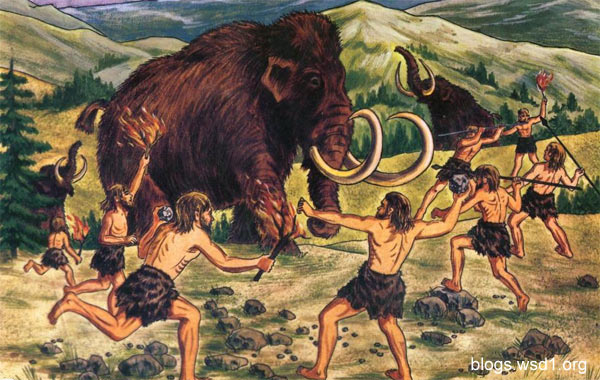General Discussion
Related: Editorials & Other Articles, Issue Forums, Alliance Forums, Region ForumsMigrating humans may have killed off Neanderthals by accident
http://www.cnn.com/2016/04/15/health/humans-responsible-for-neanderthal-extinction-by-transferring-diseases/index.htmlDid we kill off Neanderthals?
Um... no:

Scootaloo
(25,699 posts)The major reason is simply that any diseases and ailments H. sapiens carried, were almost certainly shared with neanderthals - or at least the diseases were close enough that the neanderthals could have resisted them as well as sapiens did. Herpes, mentioned in the article, is almost certainly an example of such a pan-human disease. Worms? Absolutely pan-species.
Without livestock, the primary source of alien (nonhuman) disease would have been through butchering meat. Sort of like how HIV got its start through butchering primates for food. It's pretty much without doubt that we hunted the same animals as neanderthals. Further, such direct transfer diseases are usually not communicable - you might get sick if someone slapped a weird pigeon virus into your body, but you likely would not be infectious.
There's also the fact that the populations simply weren't there for pandemics. Assuming - a big assumption - that there were some pathogen that was minor to sapiens but highly lethal for neanderthals, what would happen is that the neanderthal group would rapidly die... and that would be the end of it. No lingering infections, no "Uncle Ugg has a bad cough, but let's go to the cave art festival anyway" 'cause Ugg and his whole family would be dead, before they could go anywhere. And for constant re-infection to happen would require that sapiens and neanderthals had frequent, prolonged contact all the time. While we clearly got together and partied, there doesn't seem to have been much by way of societal mingling. probably more like "hey, we're all hunting mammoth here, want to share a tent?"
And lastly... tropical disease? With what vectors? Most of these diseases are spead by insects... and such parasitic cycles are almost always extremely finicky. Only certain mosquitoes can harbor yellow fever. Only other kinds of mosquito carry malaria. only one kind of fly carries trypanosomiasis. Only certain species of assassin bug can carry chagas. And in the damn ice age, I kinda doubt that east african insect-borne pathogens are going to find their way into the middle of Europe - especially not when the human vectors in the life cycle of these diseases are walking, on foot, over a few hundred generations.
The plain fact is that neanderthals were already in decline by the time sapiens showed up in Europe - the last ice age hit them pretty hard, fragmenting their populations into small enclaves. The resulting inbreeding on top of everything else an ice age brought no doubt had several bad effects on their populations. These small, genetically weakened populations were simply out-competed for territory and later absorbed into H. sapiens.
jwirr
(39,215 posts)Americans when Europeans immigrated to America. And also when one thinks about the Black Plague and what it did to the European population it is possible to think that type of thing could have happened before.
bhikkhu
(10,789 posts)With a 20,000 year separation in the gene pool, diseases could have evolved in the native americans that europeans had no immunity to, and europe could have depopulated instead.
At the time nobody understood diseases and tended to look at them as the judgment of god, as in, two groups collide, one is wiped out by disease, so god must have hated the one and chosen the other as his people. The psychology of that probably underpins some of what being "american" means to people still.
There is much less to go on with the neandertals. Given what we know about our genetic inheritance it seems we acquired a certain amount of disease resistance from them, which is a different thing than happened in the americas. The role of hybridization in building up disease resistance and environmental fitness is an interesting new line of study, that does tell us something new about who we are as a species.
jwirr
(39,215 posts)the gene pool? Or for that matter in evolution totally?
Scootaloo
(25,699 posts)Population density, for one. Ice Age Europe didn't have the sort of population and societal contacts to facilitate spread if diseases. Native America did.
For another, the existence of said diseases. You don't have smallpox until after you domesticate cattle. You don't get influenza until you have large flocks of poultry. You don't worry about bubonic plague without dense rat populations, which only come about with large agricultural stores. Typhus and cholera are diseases of dense populations, which only come from sedentary agricultural societies.
jwirr
(39,215 posts)Scootaloo
(25,699 posts)This "HUMANS DESTROYED THE NEANDERTHALS THROUGH X" drives me up the wall. It's a clear case of modern people taking modern scenarios and modern guilt and trying to transplant them back to the ice age. Neanderthals are a stand-in for native populations, and sapiens a stand-in for imperial european powers. it's a morality play among mammoths, and it's silly.
So, what happened to the neanderthals? Well... nothing, really. I mean there aren't "neanderthals" anymore, sure, but they didn't exactly "die off." We didn't kill them, we didn't infect them, we didn't outcompete them into starvation.
We bred with them. neanderthals were not "destroyed," they were absorbed. They have little modern genetic impact because they were a small population to begin with, thirty thousand years ago, and due to simple genetic attrition.
Rhiannon12866
(252,158 posts)

yuiyoshida
(45,090 posts)
I bet The Donald couldn't take down a Mastodon if he tried.
dawg
(10,777 posts)They just weren't as social as us; and they stuck to their own small family groups. Over hundreds of years, those small groups all died out - as small unconnected groups of people tend to do.
Lucky for them, our ancestors thought some of them looked pretty hot. So their DNA lives on inside of us to this day.
lindysalsagal
(22,840 posts)Or, rather, non-dating.
dawg
(10,777 posts)but you look pretty hot!
Sounds good to me. ![]()
bhikkhu
(10,789 posts)and then they rather suddenly dwindle and die out. What changed is we showed up. I'm inclined to think that we out-bred and absorbed them, based on the genetic evidence. Or rather that we interbred and then the descendants of that interbreeding outbred both of the prior unique groups. Particularly when it comes to disease resistance in new environments hybridization leads to more fit individuals.
Scootaloo
(25,699 posts)Except that the "big change" was not modern humans. Neanderthals and modern humans (and denisovan humans too!) had been interacting for a pretty long time before the last glacial period. The neanderthal population of the near east is probably why sapiens' first established Eurasian populations came from the Indian Coast, rather than through the near east - sapiens migrating the northeastern route were either rebuffed or absorbed by resident neanderthal populations.
(interestingly this means that neanderthals are the reason sapiens was not only the only human to reach Australia, but also why we did so as early as we did. We just hugged the Indian Ocean coastline all the way down)
The "Big Change" was that the last glacial period wrecked the Neanderthals. They had survived (but not exactly thrived) prior glacial periods, but the last one was especially harsh. it reduced the European neanderthal population to isolated "islands" on the fringe of glacial deserts, and scattered the near eastern and North African populations due to the multigenerational glacial drought that would kick-start what we see when we look at the middle east today.
What this means is that when human populations - neanderthal, denisovan, and sapiens - all began recovering and re-expanding durign the modern interglacial, sapiens simply had the largest and most genetically diverse population of the three, due to living in warmer ice-free territory during the glacial period. That means we were the one that did all the population-absorbing, unlike during hte prior interglacial, where our small migrant populations were getting absorbed.
tabasco
(22,974 posts)fingers?
yuiyoshida
(45,090 posts)whatever that means... ![]()
treestar
(82,383 posts)Your photo example would have a lot of it
bemildred
(90,061 posts)AngryAmish
(25,704 posts)Throughout time Pygmies have had problems from hungry neighbors.
Pygmies, BTW, are fascinating. Very different genome than everyone else. A hardcore splitter would argue they are a separate subspecies.
bemildred
(90,061 posts)We have eaten quite a few species into extinction, and it's not like we've never had a taste for each other.
dawg
(10,777 posts) /revision/latest?cb=20121205194537
/revision/latest?cb=20121205194537libodem
(19,288 posts)Into what, I just can't say?

